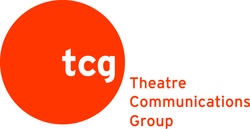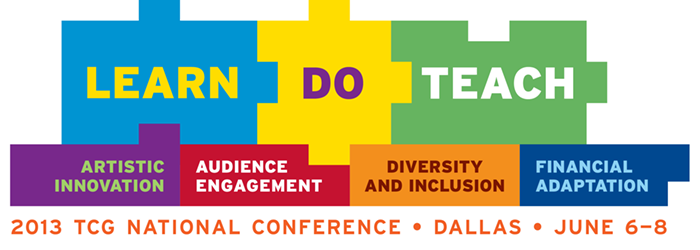 This post is a part of the Diversity & Inclusion blog salon that I led as part of the 2013 TCG National Conference: Learn Do Teach in Dallas. I am re-posting it here on my blog: Day Two of the conference was powerful, spirited and eye-opening. I was so energized from the day before and so I was open and ready to receive everything presented on Friday. I had no idea how necessary and impactful these sessions and discussion would be. I had no idea how much I would be shifted by… Race and Representation: The power of Theatre to Create a More Inclusive World led by Sarah Bellamy, Associate Artistic Director for Education at Penumbra Theatre. Before we go on, it should be known that Sarah is a true gift to the American Theatre. Her brilliant learning session was actually an excerpt of a larger workshop that she conducts around the history, evolution and impact of stereotypes. To begin, Sarah addresses the role and responsibility that theatre plays in either eliminating or perpetuating stereotypes:
To frame the conversation, Sarah posited that stereotyping is a process that relies on chains of meanings: fears and fantasies that manifest in myths. Stereotypes matter because they influence perception, which influences belief and finally access to opportunities. This is key. This is what we’re working to combat when we talk about diversity and inclusion. Next, we talked about the detrimental impact of stereotypes used as tools for comedy. This is when humor and racism is used to decide who is an “us” and who is a “them.” Sarah reminded us that:
Stereotypes act as a kind of currency within American culture. As humans we learn to sort and place value on sorting categorizing and accumulating, which is linked to capitalism. It was at this point that Sarah introduced us to the four D’s, which blew my mind and instantaneously shattered by heart:
With all of this work around stereotypes, Sarah reminded us that we have to chase the train of meaning. If we don’t understand the history of the images, then we will miss the meaning that’s been created. So when you see the image of watermelons on the White House, you understand immediate and irrevocably the incendiary intention of the message. As you can see, the session was comprehensive, challenging and necessary. There was a lot to unpack. A major question that was posed early in the session still resonates with me and deserves a great deal of meditation: how do we combat racism in a world that looks progressive? A Conversation with Ayad Akhtar with Gabriel Greene Novelist, screenwriter, playwright and winner of the 2013 Pulizter Prize for Drama for Disgraced, Ayad Akhtar is a passionate, eloquent and dynamic speaker. It was hard to take notes during this session, because I want to absorb everything he said. Fortunately, you can listen to it here. It was inspiring to hear his journey to theatre and his writing process. He grew up in a household where theatre was not a part of his growing up experience. In fact, the television show Dallas was the family’s entertainment of choice. While he knew that he wanted to be a writer when he was 15, he fell in love with theater in college. He started out writing outside of himself in a European tradition. He wanted to write something universal and didn’t think that his experiences would relate to others. As he grew older, he had a growing awareness that he was running away from something. It became clear to him that he wasn’t writing what he knew. He wasn’t writing about his identity, but that has since shifted. Towards the end of the interview, Ayad revisited Aristotle’s definition of catharsis: “the expression of emotion through pity and terror. Terror is key and is defined as when the Furies arrived on stage, women miscarried in the aisle.” This is the type of visceral response that is both religious and mass, and it’s what he strives for in his writing. It was really great to be reminded of this. By the way, I just finished reading his novel, American Dervish, which follows Hayat Shah a young Pakistani American who falls in love, discovers his faith and works through the confusion of both forces in his life. It was magnificent and absorbing. I read it in two days. His Pulitzer Prize willing play, Disgraced, will be published in the July/August issues of American Theatre Magazine and I can hardly wait. Also, he participated in an interview with Caridad Svich as part of TCG’s conversation around Artistic Innovation, which can be read here. Diversity and Inclusion Homeroom This year, the TCG Conference’s had four focused programmatic arcs--Diversity and Inclusion, Audience Engagement, Financial Adaptation and Artistic Innovation. Each day, we were divided out into homeroom sessions along our respective arc. For the Diversity and Inclusion arc, we were asked to submit have a diversity and inclusion challenge that we were wrestling with, if we wanted to hear advice and feedback from others. Understanding that Diversity and inclusion begins with awareness and advocacy, but that it must shift to action, these homerooms were a great way to strategize and build allies in our efforts. Here are some of the questions that were raised:
As these questions were asked, we quickly realized that we weren’t alone in our struggles. Here are some of the useful suggestions that were made:
We ended the conversation reflecting on Dr. Manuel Pastor’s presentation from the day before. He reminded us that the importance of theatre to social discourse. With theatre, we can reflect the important issues, values, and challenges going on in society. This is the kind of discourse that can only happen in the theatre. But in order for theatre for theatre to do this, we have to update the narrative: What theatre is now with regards to race, gender, ability, sexual orientation etc.? How is it reflective of the change that is happening in America? Always, I’d love to hear your thoughts on these questions and any of the issues address over the course of the day. If you're interested in joining TCG's online year-round conference community, check out Conference 2.0.
0 Comments
Your comment will be posted after it is approved.
Leave a Reply. |
My BlogI'm a playwright, dramaturg, and teaching artist. It is here where you'll find my queries and musings on life, theater and the world. My posts advocate for diversity, inclusion, and equity in the American Theatre and updates on my own work. Please enjoy!
Categories
All
Archives
June 2020
Reading List
|

